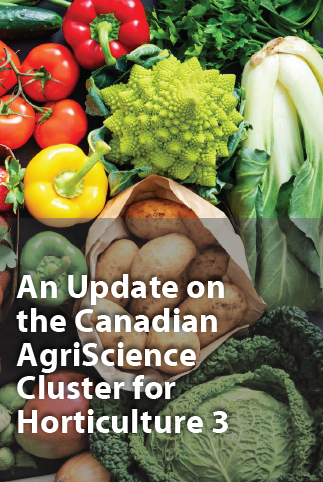Groupe horticole 3
The Fruit and Vegetable Growers of Canada (FVGC) supports the Canadian fruit and vegetable sector in part by managing funding applications and subsequent research and promotion activities that address the sector’s top priorities.
Canadian AgriScience Cluster for Horticulture 3
With an investment of nearly $21 million ($13 million by Agriculture and Agri-Food Canada’s AgriInnovation Program and $8 million by industry), Cluster 3 brings expertise from academia, industry and government together on 16 research activities across five commodity groups: apple, berry, greenhouse, potato and vegetable.
An Update on the Canadian AgriScience Cluster for Horticulture 3 – an insert from Fresh Thinking Magazine Spring 2022

Apple
Sustainable Control Practices for Apple Pests in Canada
Lead: Suzanne Blatt, AAFC Kentville
Objectives: to compare four currently used commercially available pesticide products (Exirel, Imidan, Assail and Calypso) for apple maggot control and determine how many sprays are required to effect control; to provide producers a model specific to their region to predict when apple leaf curling midge will be flying in their orchards; and Evaluate the efficacy of host volatiles to capture both males and females of various leafroller species across apple growing regions in Canada.
Optimizing Storage and Postharvest Practices to Reduce Apple Loss and Improve Quality
Lead: Jennifer DeEll, OMAFRA
Objectives: Optimize postharvest practices and storage regimes for rising cultivars; Evaluate new low oxygen storage and dynamic regimes to reduce apple loss; Investigate new technology for harvest management and fruit maturity
Berry
The Canadian Berry Trial Network
Lead: Beatrice Amyotte, AAFC Kentville
Objectives: testing new varieties and selections of strawberry, raspberry and blueberry in four provinces across Canada: British Columbia, Ontario, Quebec and Nova Scotia.
Vegetables
Optimizing Delia pest monitoring and management in vegetable brassicas
Lead: Jade Savage, Bishops University
Objective: to improve management practices for Delia pests of vegetable brassicas in Canada.
Development of All-Male Asparagus Hybrids with Improved Traits
Lead: David Wolyn, University of Guelph
Objectives: to develop improved all-male asparagus hybrids and conduct studies in pathology, physiology, and genetics that will translate into knowledge and resources that can accelerate breeding efforts.
Potato
Development of Regional Management Strategies and Decision Making Tools for Control of Colorado Potato Beetle
Lead: Chandra Moffat, AAFC
Objectives: to reduce economic losses to potato in Canadian growing regions due to herbivory by the Colorado potato beetle (CPB).
Common Scab: Increasing profitability of Canadian potato producers by controlling common scab
Lead: Claudia Goyer, AAFC
Objective: to evaluate several methods to control common scab of potato under a range of environmental conditions and soil types across Canada.
Late Blight: Tracking pathogen strains and their characteristics
Lead: Rick Peters, AAFC
Objectives: to track the distribution of strains of the late blight pathogen in Canada, determine various important biological characteristics of isolated strains including fungicide sensitivity, with the overall aim of improving disease management and economic returns.
Enhancement of Canadian Potato Industry through Smart Agriculture
Lead: Athyna Cambouris, AAFC
Objective: to develop and evaluate smart farming (precision agriculture: PA) practices suitable for application in several major potato production areas of Canada.
Investigating the occurrence and distribution of potato tuber necrosis-inducing viruses in Canada and studies on varietal responses to the viruses for minimizing economic losses cause by the pathogens
Lead: Xianzhou Nie, AAFC
Objectives: Revealing the occurrence and significance of potato tuber necrosis-inducing viruses in Canada; Developing accurate and efficient procedures to detect the viruses in hosts and vectors and to unveil the spread and epidemiology of the viruses, especially the soil-borne PMTV; Investigating varietal responses to the most prominent tuber necrosis-inducing virus(es), and identifying insensitive and/or resistant cultivars to the viruses.
Generate and Evaluate Integrated Pest Management Tools for Wireworm Control in Potatoes in Canada
Lead: Christine Noronha, AAFC
Objectives: Test the efficacy of new insecticides to control wireworms and click beetles; Evaluate an integrated approach to manage wireworm damage; Identify and apply novel click beetle monitoring tools; Surveillance of click beetle expansion in Canadian potato growing regions.
Variety Evaluation
Lead: Virginia Dickison, AAFC
Objective: to evaluate the performance of advanced breeding selections and recently released varieties in comparison to standard potato varieties grown in each region of Canada to assess their potential as viable varieties for a particular region.
Canadian Potato Early Dying Network (CanPEDNet)
Canadian Potato Early Dying Network (CanPEDNet)
Lead: Mario Tenuta, University of Manitoba
Objectives: To reduce the severity of Potato Early Dying (PED), a major yield-limiting factor in all major potato production areas of Canada, by providing potato growers with the knowledge, tools and technologies to manage PED, and increase potato productivity and profitability in Canada.
Greenhouse
Integrated Management of the Pepper Weevil, an invasive pest of greenhouse pepper crops in Canada
Lead: Roselyne Labbe, AAFC Harrow
Objectives: This activity aims to address the current need for new tools for pepper weevil management, with an emphasis on reduced-risk conventional agents, bio insecticides and biological control agents.
Evaluating biological control strategies for the tomato leaf mining moth (Tuta absoluta), a potential invasive greenhouse pest
Lead: Roselyne Labbe, AAFC Harrow
Objectives: This activity will identify and develop new biological control tools that would be made available to greenhouse growers in Canada to mitigate the risks of crop losses associated with the potential invasion of the tomato leaf miner.
Reduced production cost and enhanced labour efficiency using the Guelph Intelligent Greenhouse Automation System
Lead: Medhat Moussa, University of Guelph
Objectives: This activity aims to build on the current Guelph Intelligent Greenhouse Automation System (GIGAS) scouting prototype and on previous research in harvesting and de-leafing to develop and field test an autonomous integrated prototype for a harvesting/de-leafing robot.
The Canadian Agri-Science Cluster for Horticulture 3, is generously funded in cooperation with Agriculture and Agri-Food Canada's AgriScience Program, a Canadian Agricultural Partnership initiative, The Fruit and Vegetable Growers of Canada and industry contributors.

The Government of Canada invests to advance Canadian horticulture (AAFC News Release - March 6, 2019)
Government of Canada research investment to help manage costly potato disease (AAFC News Release - March 11, 2020)
Agriculture and Agri-Food Canada's Canadian Agricultural Partnership
The Canadian Agricultural Partnership is a five-year, $3 billion investment by federal, provincial and territorial governments to strengthen the agriculture and agri-food sector. Agriculture and Agri-Food Canada delivers federal programs under the Canadian Agricultural Partnership aimed at generating economic growth in the agricultural sector.
The AgriScience Program aims to accelerate the pace of innovation by providing funding and support for pre-commercial science activities and cutting-edge research that benefits the agriculture and agri-food sector and Canadians. AgriScience Clusters are intended to mobilize industry, government and academia through partnerships, and address priority themes and horizontal issues that are national in scope. For more information on the AgriScience Clusters, visit AAFC's website.
For more information on FVGC's past projects and programs
contact Amy Argentino, Manager, Projects and Programs.
Nous contacter
Planning for Hort Cluster 4: The Fruit and Vegetable Growers of Canada (FVGC) is actively preparing for the opportunity to establish a fourth Canadian AgriScience Cluster for Horticulture under Agriculture and Agri-Food Canada's (AAFC) next agricultural policy framework for 2023-2028. For more information, visit our Planning for Hort Cluster 4 page.


